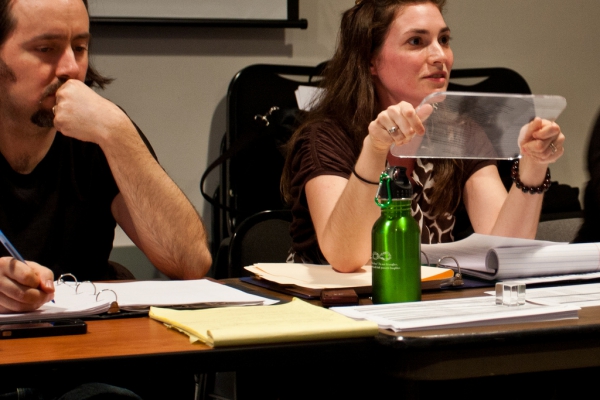DEINDE: First Weekend Rehearsal Report

Post by August Schulenburg. Photos by Isaiah Tanenbaum.
The first and most important thing to say is that we have a shot – a real, legitimate chance – at a great production. We always try to create at least a good production, but we take on risky, ambitious plays, and part of that risk is embracing a degree of failure. After our first read-through of DEINDE, however, I can say (however non-objectively) that we have the potential for a truly great production.
The cast in as uniformly strong as any we’ve had, with some of the supporting roles creating deeply funny, moving, and human portraits of characters we only see for shorter amounts of stage time. We joked that Matthew Murumba’s Bobby Pachachi should have a spin-off play – The Strings of Bobby’s Guitar – and made similar jokes about Matthew Trumbull’s Daniel Nemerov – A Rising Nemerov. The Ensemble feel that we strive to create felt palpable and potent this weekend, and I feel truly blessed to have these actors and designers working on this show (not to mention the ever-present awesome of Jodi Witherell as Stage Manager).
It was also a humbling weekend for me as a playwright. The actors asked tough questions about the world of the play for which I did not always have fully satisfying answers. This is due in part to a certain disregard for back story that (and I know that just because HE did it doesn’t mean I can get away with it) I learned from Shakespeare. The play operates under “Hamlet-Time”, that particular species of narrative-clock that is driven by emotion and disrespectful of logic.
This is due, in part, by my belief that theatre lives in memory and so is subject to memory’s rules. Memory is notoriously fallible, subject to the pressures of the present moment, borne on the whims of our senses, bearing little resemblance to the perfect 1s and 0s of computer memory. When a play works, it does so not because it imitates the rules of time but it because it captures the rhythms of memory, nestling like sand in our minds for recollection to polish into something shining.
I feel my writing is most successful when I create the conditions that allow me to write quickly, instinctually: there is something about the creative leaps of rhapsodic thought that only a certain momentum can provide.
But actors – and I speak as one who sometimes is – can not operate on the shifting sands of rhapsody. Back-story is the ground beneath our feet: whatever happened to the child that Lady Macbeth lost is essential to an actor understanding how and why she does what she will do. The time that has passed between a scene is essential to understanding the given circumstances, and the rules of the world are what give actors our freedom.
So it was that hard questions were asked and answers of uncertain durability were given…but it is only the first weekend, and we have long (short) ((precious)) time to go.




Recent Comments